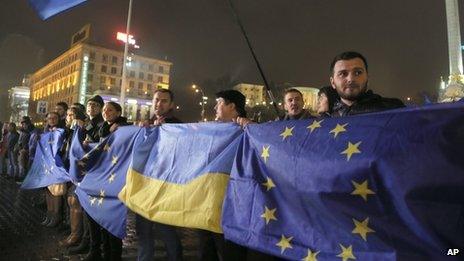Ukraine media see Kremlin pressure over EU
- Published

Ukrainian media are trying to explain Kiev's decision to suspend plans for a deal on closer integration with the EU.
Some commentators say the country was forced into the move as co-operation with Europe could lead to "big losses in Russian markets".
Analysts in Russia are more blunt in their assessment, seeing Ukraine's U-turn as a result of direct pressure from Moscow.
'Tired of waiting for mercy'
The pro-government Ukrainian tabloid Segodnya says the authorities had no choice but to pull out of the EU deal.
The paper says Ukraine was "tired of waiting for mercy from both the EU and Russia", and portrays the U-turn as "launching an offensive".
"The EU is apparently unprepared to help us financially to the extent we need to escape a financial crisis. Meanwhile, Russia is threatening us with trade wars," it says. "As a result, we have suspended preparations for the signing of an association agreement with the EU."
An apologetic Ukrainian political analyst, Vadym Karasyov, tells the Ukrainian version of Russian tabloid Komsomolskaya Pravda that "we have suspended the talks, not European integration". He argues that "an association with the EU currently entails big losses on Russian markets" and adds that Kiev should now try and "allay Russian fears that a free trade zone between Ukraine and the EU carries economic risks for the Kremlin".
The Ukrainian version of another Russian daily, Kommersant, goes even further by suggesting that, in return for suspending plans for the landmark agreement with the EU, "the [Ukrainian] government expects to receive financial assistance from Russia and resume trade with the CIS [an association of ex-Soviet states]".
The editor in chief of Den seems to be one of the few to sound alarm bells. "The Ukrainian pause is a very dangerous phenomenon. We are not isolated in this world. Sabre-toothed tigers are roaming nearby, keen to take advantage of our failure," says Larysa Ivshyna. She adds that "Ukraine's fate" was decided at a secret meeting between Ukrainian President Viktor Yanukovych and his Russian counterpart, Vladimir Putin.
Ukrainian news and analysis website Ukrayinska Pravda also laments the fact that Kiev, which was "one step away from its goal", suddenly backed down.
Meanwhile, the Glavred website predicts that the move could trigger a political crisis in Ukraine. "The government's decision gave a boost to protest moods and led to spontaneous pro-Europe protests in central Kiev," it reports.
'Stealing the bride at the altar'
The Russian press links Ukraine's decision with arm-twisting from Moscow.
Writing in Nezavisimaya Gazeta, Tatiana Ivzhenko recalls that the text of the agreement between Kiev and Brussels "was prepared over many years and was fully approved by the Ukrainian side". She says the Ukrainian U-turn came after "three secret meetings" between Mr Yanukovych and Mr Putin. "Europe was shocked by the instantaneous change of Kiev's foreign policy vector and linked it to pressure from Moscow," she writes.
"It was an impressive move - like stealing a bride at the altar, says a Russian federal official source jokingly," writes business daily Vedomosti. The paper also quotes political pundit Alexei Portansky, who says "this is a win for Putin, but only a temporary one". "Ukraine won't join the customs union or abandon European integration. Kiev has been forced to back down for the time being, under pressure from the Kremlin, fearing that Moscow would use the harshest measures," says Portansky.
Speaking to Kommersant, political analyst Alexei Vlasov says Kiev's decision was influenced by worries about "the personal political future" of Ukraine's president. "Yanukovych wants to be re-elected in 2015, and Euro integration is a second-order issue for him," Vlasov says.
BBC Monitoring reports and analyses news from TV, radio, web and print media around the world. For more reports from BBC Monitoring, click here. You can follow BBC Monitoring on Twitter and Facebook.
- Published22 November 2013
- Published21 November 2013
- Published21 November 2013
- Published21 June 2023